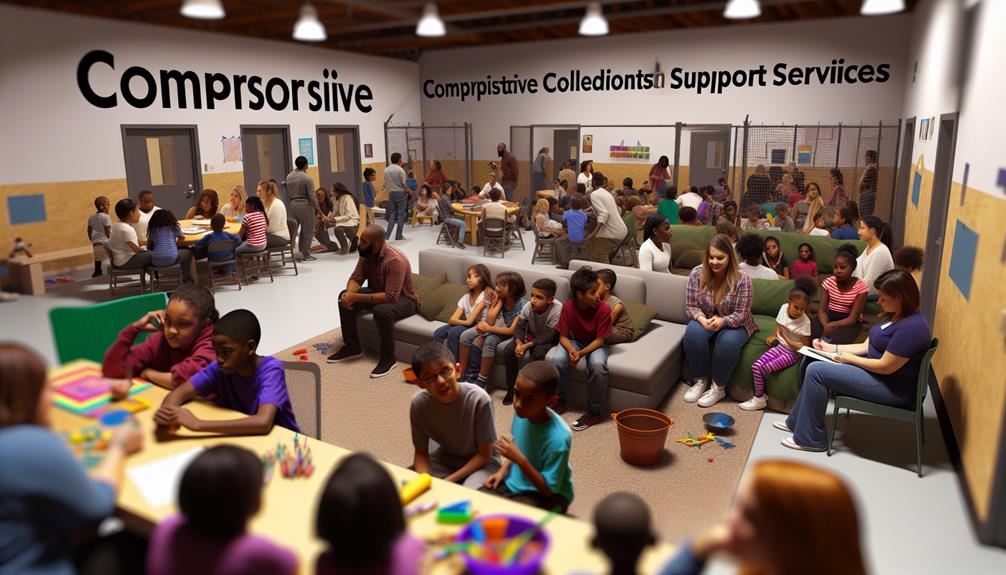Navigating the impact of the opioid epidemic on foster care is like charting a treacherous sea, with its unpredictable currents and hidden dangers. As a professional in the field, you understand the urgency of finding effective strategies to address this crisis. But where to begin?
In this discussion, we will explore six essential tips that can help you navigate these troubled waters, offering practical insights and guidance to ensure the well-being of foster children affected by opioid addiction.
From recognizing the signs of abuse to supporting foster parents, each tip will provide you with valuable tools to tackle this pressing issue head-on.
So, join us as we embark on this journey together, seeking solutions and striving to make a difference in the lives of those most vulnerable.
Understanding the Foster Care Crisis

Understanding the foster care crisis requires a comprehensive analysis of the complex factors that contribute to the alarming rates of children entering the system. Foster care statistics reveal a daunting reality – in the United States alone, there are approximately 437,000 children in foster care, with over 690,000 unique children having experienced foster care at some point during the year. These numbers highlight the magnitude of the crisis and the urgent need for a deeper understanding of its causes and consequences.
Research has shown that children who experience foster care may face long-term effects that can have lasting impacts on their well-being. Studies indicate that children in foster care are more likely to struggle academically and have lower educational attainment compared to their peers. They also face a higher risk of mental health issues, such as anxiety and depression. Additionally, these children often struggle with forming secure attachments and maintaining stable relationships, which can hinder their social and emotional development.
The foster care crisis isn't isolated; it's influenced by a myriad of interconnected factors. Poverty, substance abuse, parental incarceration, and domestic violence are just a few of the complex issues that contribute to the high rates of children entering foster care. Understanding these factors and their interplay is crucial for developing effective strategies to address the crisis and provide better support for children and families in need.
Recognizing the Signs of Opioid Abuse in Foster Care
Recognizing the signs of opioid abuse is crucial in the context of foster care, as it allows for early intervention and support for the affected children and families. The opioid epidemic has had a significant impact on the foster care system, with an increasing number of children being placed in foster care due to parental substance abuse. Identifying the signs of opioid abuse in foster care can help professionals and caregivers provide the necessary help and resources to these vulnerable children.
One of the key signs of opioid abuse in foster care is neglect. Children whose parents are struggling with opioid addiction may experience neglect in terms of basic needs, such as food, clothing, and shelter. They may also suffer from emotional neglect, as their parents may be emotionally unavailable or preoccupied with obtaining and using opioids.
Another sign to watch for is physical and behavioral changes. Children exposed to opioids may exhibit symptoms such as drowsiness, poor coordination, and slurred speech. They may also display behavioral changes, including aggression, irritability, and difficulty concentrating.
It is important to note that these signs alone don't confirm opioid abuse, as they can also be indicative of other issues. However, if multiple signs are present, it's essential to seek professional help and support for the child and the family. Early recognition of these signs can ensure timely intervention and prevent further harm to the child's well-being.
Implementing Comprehensive Support Services

Comprehensive support services play a crucial role in addressing the multifaceted needs of children affected by the opioid epidemic in foster care. These services are essential in providing a holistic intervention approach that takes into account the physical, emotional, and psychological well-being of the children.
One aspect of comprehensive support services is the provision of medical and therapeutic care. Children in foster care who've been exposed to opioids often suffer from various health issues, including withdrawal symptoms and developmental delays. It's important to provide them with access to medical professionals who can address these issues and monitor their progress towards long-term recovery.
In addition to medical care, comprehensive support services should also include therapeutic interventions. This can involve individual and group therapy sessions, where children can express their feelings and learn coping mechanisms. These therapeutic interventions aim to address the emotional and psychological impact of the opioid epidemic on the children, helping them to heal and develop resilience.
Furthermore, comprehensive support services should also encompass educational support. Children affected by the opioid epidemic may struggle academically due to disruptions in their lives. By providing them with educational support, such as tutoring and specialized programs, we can help them catch up and succeed in school, giving them a better chance at long-term recovery and a brighter future.
Strengthening Collaboration Between Child Welfare and Healthcare Systems
Collaboration between child welfare and healthcare systems is crucial in addressing the complex needs of children impacted by the opioid epidemic in foster care. To effectively strengthen this collaboration, it's essential to implement specific strategies and establish efficient communication channels. Here are three key areas to focus on:
- Developing shared goals and objectives:
Establishing common goals between child welfare and healthcare systems is vital. This can be achieved through regular meetings and discussions where both parties can align their strategies and interventions to ensure the best outcome for the children in foster care. By working together, they can pool their resources and expertise to provide comprehensive support and address the specific needs of these children.
- Promoting information sharing:
Effective collaboration relies on the timely exchange of information. Implementing secure communication channels, such as electronic health records and case management systems, can facilitate the sharing of critical information between child welfare and healthcare professionals. This enables them to have a comprehensive understanding of each child's medical history, treatment plans, and progress, ultimately improving the continuity of care.
- Establishing interdisciplinary teams:
Creating interdisciplinary teams composed of professionals from both child welfare and healthcare systems promotes a holistic and coordinated approach to addressing the needs of children in foster care. These teams can consist of social workers, physicians, nurses, therapists, and other relevant professionals who collaborate closely to develop individualized care plans and monitor progress. Regular team meetings and case conferences ensure ongoing communication and coordination of efforts.
Promoting Trauma-Informed Care for Foster Children Affected by the Epidemic

To effectively address the complex needs of foster children affected by the opioid epidemic, it's imperative to prioritize the implementation of trauma-informed care practices. These practices recognize the impact of trauma on the child's development and behavior, and aim to create a safe and supportive environment that promotes healing and recovery.
Research has shown that trauma-informed interventions, such as therapy and counseling, can greatly benefit foster children by addressing their emotional and psychological needs.
One essential aspect of trauma-informed care is providing therapeutic support to foster children. This involves ensuring that they've access to mental health services, such as counseling and therapy, that are specifically tailored to address the effects of the opioid epidemic and the associated trauma. These interventions can help foster children develop coping mechanisms and build resilience, enabling them to better navigate the challenges they may face.
In addition to therapeutic support, trauma-informed care also emphasizes the importance of creating a nurturing and stable environment for foster children. This involves training caregivers and professionals involved in the child welfare system on trauma-informed practices, so that they can provide the appropriate care and support. It also includes implementing trauma-informed policies and procedures within the child welfare system, such as trauma screenings and assessments, to ensure that the unique needs of foster children affected by the opioid epidemic are identified and addressed.
Supporting Foster Parents in Navigating the Challenges of Opioid Addiction
Supporting foster parents in navigating the challenges of opioid addiction requires equipping them with the necessary resources and knowledge to effectively care for children affected by this epidemic. Foster parent resources and addiction education play a crucial role in providing the support and guidance needed to address the unique needs of foster children in this situation.
To assist foster parents in their journey, the following resources and strategies can be implemented:
- Education and Training: Providing foster parents with comprehensive training on opioid addiction, its impact on children, and strategies for addressing the associated challenges can equip them with the knowledge and skills needed to provide effective care.
- Support Groups: Creating support groups specifically tailored for foster parents dealing with opioid addiction can provide a safe space for sharing experiences, seeking advice, and finding emotional support from others facing similar challenges.
- Access to Mental Health Services: Ensuring that foster parents have access to mental health services, including therapy and counseling, can help them cope with the emotional toll of caring for children affected by opioid addiction.








